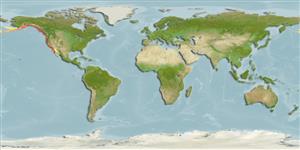Environment: milieu / climate zone / depth range / distribution range
Ecology
Marine; demersal; depth range 0 - 549 m (Ref. 6793), usually 15 - ? m (Ref. 27436). Temperate; 60°N - 22°N, 177°E - 109°W
Eastern Pacific: Bering Sea coast of Alaska to Cabo San Lucas, southern Baja California, Mexico. Occurrence in Nicaragua (Ref. 13613) needs validation.
Size / Weight / Age
Maturity: Lm ? range ? - ? cm
Max length : 41.0 cm TL male/unsexed; (Ref. 2850); max. reported age: 9 years (Ref. 72462)
Dorsal spines (total): 0; Dorsal soft rays (total): 86 - 102; Anal spines: 0; Anal soft rays: 67 - 81; Vertebrae: 38 - 40. Caudal rounded; pectorals rather large and pointed (Ref. 6885). Eyed side dull brown or tan irregularly mottled with dark; Dorsal, anal, caudal and anal fins black; blind side white to pale brown (Ref. 6885). Freshly caught males with dull orange spots and blotches (Ref. 6885). Young light olive green on eyed side, finely and sparsely speckled with brown, black, and orange, especially on fins (Ref. 6885).
Body shape (shape guide): fusiform / normal.
Found on sand bottoms (Ref. 2850). Young may occur at depth less than 9 m (Ref. 2850).
Distinct pairing (Ref. 205).
Eschmeyer, W.N., E.S. Herald and H. Hammann, 1983. A field guide to Pacific coast fishes of North America. Boston (MA, USA): Houghton Mifflin Company. xii+336 p. (Ref. 2850)
IUCN Red List Status (Ref. 130435: Version 2025-2)
Threat to humans
Harmless
Human uses
Fisheries: commercial; gamefish: yes
Tools
Special reports
Download XML
Internet sources
